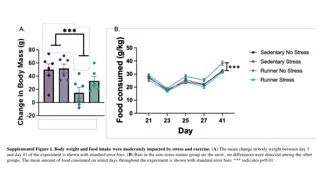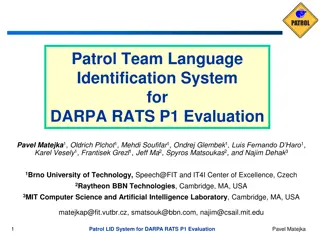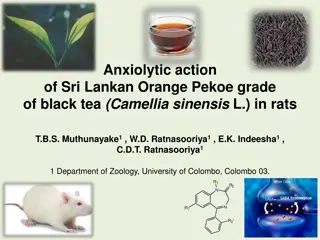Immunoglobulin Titers in OVA-Sensitized BN Rats: Long-Term and Short-Term Protocols
This study investigates immunoglobulin titers in OVA-sensitized BN rats using long-term and short-term protocols. The long-term protocol involves sensitization with OVA through intraperitoneal injections over 12 weeks, while the short-term protocol includes sensitization on specific days with different adjuvants. Blood samples were collected to measure serum levels of allergen-specific IgE and total IgE. The study also examines intestinal changes upon local allergen challenge, analyzing the effects of repeated allergen exposure on the intestinal tissue of sensitized animals. Results provide insights into the immune response dynamics in sensitized rats.
Download Presentation

Please find below an Image/Link to download the presentation.
The content on the website is provided AS IS for your information and personal use only. It may not be sold, licensed, or shared on other websites without obtaining consent from the author.If you encounter any issues during the download, it is possible that the publisher has removed the file from their server.
You are allowed to download the files provided on this website for personal or commercial use, subject to the condition that they are used lawfully. All files are the property of their respective owners.
The content on the website is provided AS IS for your information and personal use only. It may not be sold, licensed, or shared on other websites without obtaining consent from the author.
E N D
Presentation Transcript
November 2024 doc.: IEEE 802.11-24/1868r1 A Technical Proposal for TGbi Date: 2024-11-13 Authors: Name Dan Harkins Affiliations HPE Address Phone email Jouni Malinen Qualcomm Mike Montemurro Huawei Submission Slide 1 Dan Harkins, HPE
November 2024 doc.: IEEE 802.11-24/1868r1 Abstract The reason for a personal motion in the mid-week plenary Submission Slide 2 Dan Harkins, HPE
November 2024 doc.: IEEE 802.11-24/1868r1 Background on Password Identifiers Back in 2001, PSK authentication was designed under an assumption: one secret for the whole network. SAE inherited this unfortunate architectural design There is significant demand for supporting multiple secrets on a single SSID though. The technique used for supporting multiple credentials on a PSK network does not work on an SAE network (by design). Password identifiers were added to SAE nearly a decade ago Password identifiers allow for a password to be either unique to a device or shared among devices and multiple passwords can be supported on a single SSID Password identifiers are passed in the clear during the SAE exchange Submission Slide 3 Dan Harkins, HPE
November 2024 doc.: IEEE 802.11-24/1868r1 What s The Problem? Password Identifiers have a privacy issue Since SAE Password Identifiers are passed in the clear, they potentially expose Personally Identifiable Information (PII), especially in the degenerate case where they are used like usernames each device gets its own password/identifier pair TGbi has an approve document describing requirements for the project: 11-21/1848r16 which includes: 11bi shall define a mechanism to prevent an evesdropper distinguishing whether authentication exchanges between CPE Clients and CPE AP use identical SAE credentials or distinct SAE credentials (where a CPE AP supports multiple SAE credentials). To satisfy the requirement, the group needs to come up with a solution that protects SAE password identifiers over the air Submission Slide 4 Dan Harkins, HPE
November 2024 doc.: IEEE 802.11-24/1868r1 OK, So What s The Solution? There is a proposal to address this problem and protect SAE password identifiers: 11-24/0046r3 Unfortunately, a voting bloc of members having the same affiliation has consistently voted no on any attempt to address this requirement, including 11-24/0046 Members of this bloc have refused repeated questions to explain their opposition or to suggest changes that could change their no votes to yes No alternative ways of addressing the requirement have been proposed The TG needs to address this issue and it has not been able to because of this voting bloc Given the importance of preserving privacy and that ultimately the approval of P802.11bi rests with the WG, we believe the WG should consider this specific issue. This would allow TGbi to progress and meet its objectives. Submission Slide 5 Dan Harkins, HPE
November 2024 doc.: IEEE 802.11-24/1868r1 Proposed Motion Instruct the TGbi editor to incorporate the changes indicated in 11-24/0046r3 into the TGbi draft Motioned: Seconded: Y: N: A: Submission Slide 6 Dan Harkins, HPE
November 2024 doc.: IEEE 802.11-24/1868r1 References https://mentor.ieee.org/802.11/dcn/21/11-21-1848-16-00bi- requirements-document.docx Submission Slide 7 Dan Harkins, HPE























